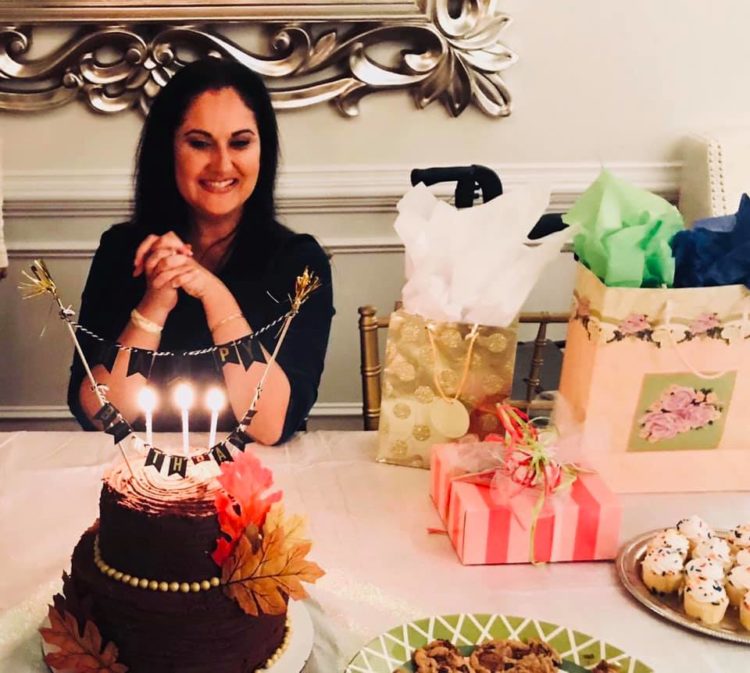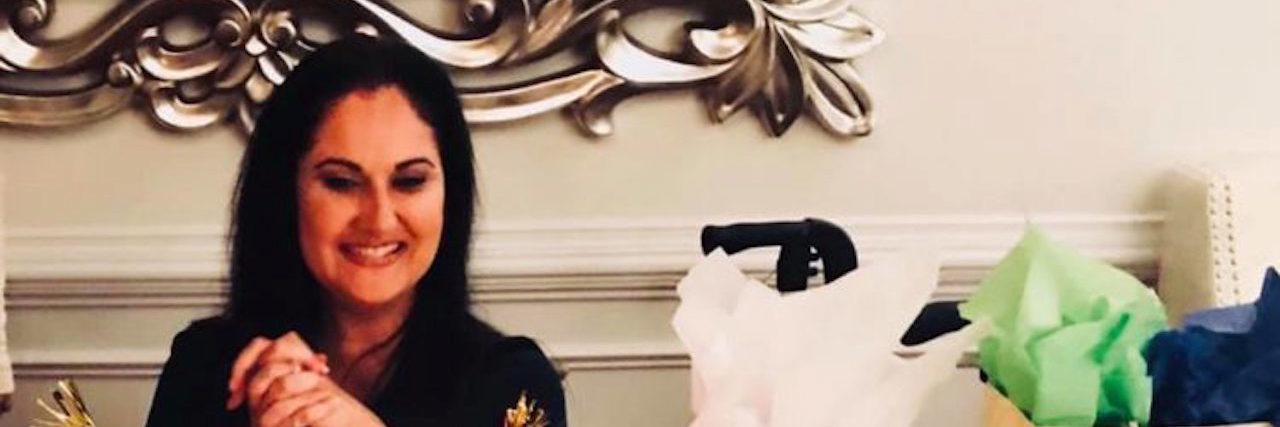My 'Master Class' Reflections of Living With a Progressive Rare Disease
Two weeks ago, I happily celebrated my 42nd birthday, a day of beautiful memories made with my loving husband and close friends. Happy, genuinely happy, is the best way to describe the sentiment I floated in, all the while with a gnawing reminder to write about why this year in particular, is significant. It’s one of those years that in the future I will probably want to be reminded of what I was thinking, how I was feeling, how did I cope and what helped me persevere.
A week before Christmas, 25 years ago, at the age of 42, my birth mother took her own life. I remember exactly where I was, at home sitting on the sofa with my dearest school friend Patricia at my side, the two of us watching “Born on the Fourth of July” for a school project, when my father unexpectedly came home early from work, confusingly with his eldest sister, to tell my younger brother and I that our mother had passed away.
Devastated.
Hysterical.
Distraught.
The delirium blacked out a lot of that first hour and the days after leading up to the funeral. I was only 17 years old, an overly insecure teenager with an unsettling past. That last year of high school would be one of extremes that I was not equipped to handle very well, collapsing in the hallways crying uncontrollably. Struck with grief, I overloaded my schedule with too many sport leagues, the school play and university prep, anything to keep me from dealing with the trauma and tragedy. It would be two decades until I sought professional counseling to deal with my thunderstorm of insecurities, the raging guilt of not being there to save her, as I believed I had done calling 911 when she attempted suicide twice before, and the fear of abandonment with setting boundaries.
However, the reflection that I have been nagging myself to write is not about my mother’s death or how I grieved with heart wrenching anger and made oh so many poor decisions while in mourning spanning over 20 years, rather to reflect on where I am at now, the same age when depression and alcoholism viciously snuffed out my mother’s light.

At 42 years old, I’m not where I thought I would be in the ruby decade. By now, I thought I’d be long married with five teenage children, working as a United Nations diplomat in the next rotation of exotic countries I’d call home for a few years each, still dancing up a storm no matter how small or large the dance floor, and financially secure to afford higher education for all my children and give back to my father (and beloved step-mother), who slogged selflessly for so many years to take care of my brother and me.
While some of those dreams came true, others were not meant to be. My life has taken me on an uncharted path, one that I don’t think anyone would choose or one I could have sufficiently prepared myself for, a journey of daring bravely in the face of vulnerability, discovering new purpose and being tirelessly tenacious.
I was diagnosed with a cruel, progressive muscle-wasting disease that leads to severe impairments – even complete loss – from head to toe, a rare type of muscular dystrophy called hereditary inclusion body myopathy (HIBM) just 12 years ago. While it has taken me time to enthusiastically embrace my new reality of living proudly with a disability, I have strived to use my experiences and the platform my career has afforded me, to be of service to others and a fierce advocate for disability inclusion. Oprah calls this way of life a Master Class. While I am far from making the level of prolific contributions to humanity like the role models Oprah features on her show, devoting myself to a lifetime of service worthy of teaching a Master Class, is an ambitious goal to keep me humble and speaking up, even when I am struggling in my own.
It’s taken me two weeks since my wonderful birthday celebration to sit down and write this reflection. Being busy is the excuse used for every pathetic procrastination, but yesterday, something profound knocked me down so boldly, that it quieted my mind to a faint whisper. I could hear my heart talking. So today, I sit at my computer feeling a little beat up but distinctly aware that from this fall, again I will rise.
Yesterday, I was in a four-hour assessment with an occupational therapist tasked with identifying what kind of hand controls I need to adapt my vehicle. We dissected into minute detail to the slightest movement, how my body will continue to lose function as the disease progresses. It was when in reviewing my poor-scoring strength tests she candidly said, “Technically you are already quadriplegic,” that an atomic cloud of shock and distress exploded inside of me. I tried to quell the lump in my throat and hold back the swelling tears.
All of a sudden, maybe for the first time, I felt in my heart the weight of living with HIBM. I could not intellectually bench press the latest bench mark of the disease’s progression into an inspirational pep talk about living bravely in the face of adversity. Driving home, I sobbed, choking rivers of tears as long as those I cried when my mother died 25 years ago. For the rest of the day, into the evening, I was solemnly quiet.
It’s taken me over a decade to internalize the severity of HIBM. That’s a long time, considering I have been living with the diagnosis since I was 30. There’s been no way to fool myself that my body wasn’t weakening, as basic functions became increasingly difficult and some impossible, like standing from a seated position or stepping one step without an assistive aid or someone’s help. The difficulty of raising my arms to shake hands, getting dressed, putting on makeup, styling my hair and reaching up to take the milk jug from the fridge, tell me that my upper body muscles are in fact considerably weak. Nevertheless, I honestly don’t think I ever really imagined that HIBM would affect me so severely as I have known it to ravage the bodies of many others around the world, as I do now.
So, here is my truth: a sliver of me is a little sad mourning what I’ve lost and the new loss to come. Another sliver is seriously concerned about how we are going to afford the adaptive equipment that will enable me to continue being independent for as long as possible, and a third sliver is astutely aware of how many more barriers, attitudinal and physical, I am going to have to break down to still be taken seriously as a professional who deserves to be fairly represented, equally included and equitably compensated for my work.
Unbeknown to me, my 42nd birthday plans to reflect on my mother’s tragedy and feeling ready to once again embrace the immense joy and traditions of the holiday season, I find myself distracted by the triumph of learning from her struggle, which in fact has helped arm me for mine. Our stories are in many ways the same and undeniably connected.
While my story will never be an episode on “Oprah Presents Master Class,” I feel graced in knowing that in my 42nd circle around the sun, in the words of the grande dame, I am someone who has “fully stepped in and owned the full progress and trajectory of their life” and “knows how to live, how to course correct, how to keep going, how to never quit, how to rejoice in the good times and have faith in the bad.” I, therefore, humbly present this reflection as the first chapter in my Master Class.

